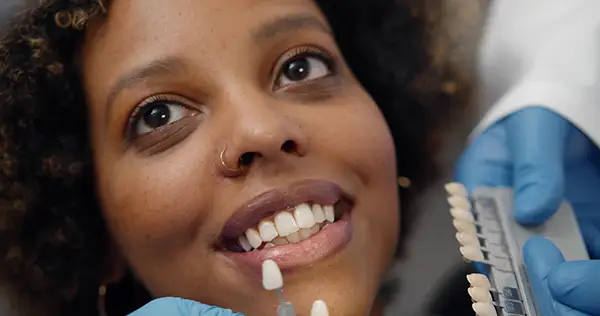Different types of veneers Dental veneers are one of the most popular cosmetic treatments we offer at Durham Prosthodontics. There are several types of veneers and they can be used to rectify a variety of cosmetic concerns. For instance, some of these concerns are discoloration, minor chips and breaks, tooth decay, misshapen teeth, and gaps in between teeth. Dental veneers are one of the most popular cosmetic treatments we offer at Durham Prosthodontics. There are several types of veneers and they can be used to rectify a variety of cosmetic concerns. For instance, some of these concerns are discoloration, minor chips and breaks, tooth decay, misshapen teeth, and gaps in between teeth.Types of VeneersPorcelain and composite veneers require extensive tooth preparation before their application; however, no prep veneers do not require any or that much preparation. The downside, however, is that this grinding down teeth is a permanent procedure that cannot be reversed. It requires a local anesthetic or sedation. The procedure, however, depends on your dental condition and concerns. For example, the number of teeth to be restored accounts for the amount of tooth reduction. Before the procedure starts, the dentist will show you a model of what your restorations could look like. Porcelain VeneersPorcelain veneers offer the best aesthetically pleasing appearance as they resemble your natural teeth. These require grinding down the tooth to ensure a precise fit. The dentist takes impressions of the curved down tooth to make a custom-fit veneer in the lab. Temporary veneers may be used before the permanent one is cemented in place on the tooth. Once the lab sends your veneers to us, we can schedule a time for your veneer placement. We simply check that the porcelain veneer looks natural and fits comfortably. Once we ensure that this is the case, we use a dental bonding procedure to attach the porcelain veneer. Composite VeneersFor resin-based composite veneers, the process begins by cleaning and preparing your teeth. Once your tooth is prepared, we will sculpt the composite resin to your tooth. In some cases, it is not necessary to remove enamel at all. Composite resin veneers also match up the tooth color and require the dentist to etch the tooth's surface before applying the composite material in thin layers to the tooth. You might also require more layers to be applied to attain your desired look. After each layer is applied, a special heat or light is shone on the tooth to cure or harden it. This process causes the composite resin to harden instantly, making it appear like it is a part of your natural tooth. We can still smooth the resin and polish the tooth to make final adjustments as needed after the resin has been cured. No Prep VeneersNo prep veneers require minimal or no tooth modification before their placement. If tooth reduction has to be made, no prep veneer tooth reduction only involves the enamel. Am I a Candidate for Dental Veneers?We will thoroughly examine your dental cavity, assessing for signs of tooth decay and gum disease. Such dental conditions may prevent you from veneer treatment until they are resolved first. Veneers are mostly preferred for healthy teeth and mouth. Caring for your veneers goes hand in hand with caring for your oral health. Regular brushing and flossing help maintain them for longer and prevent staining. Visit us for your veneer and cosmetic treatments at Durham Prosthodontics or call us via (919) 489-8661. |

Contact Information3709 University Dr Suite D Durham, NC 27707-6224 (919) 489-8661 info@mydurhamdentist.com Follow Us |